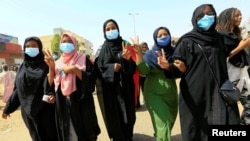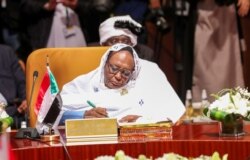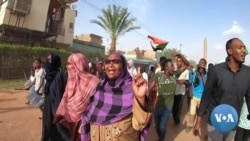Sudanese women helped organize the protests that resulted in the ouster of former President Omar al-Bashir in 2019 after three decades of iron-fisted rule.
After his removal and the creation of a new transitional government, women are playing a prominent role in Sudan's politics.
A woman has been appointed a chief justice — the first, not only in Sudan but in the entire Arab world.
An unprecedented four women were appointed to cabinet positions in the new government, including the country's first female minister of foreign affairs, Asma Mohamed Abdalla.
But women are still marching to amend the laws and restore the rights taken from them under the strict Islamic code enforced by Bashir's government.
The Sudanese Professionals Association, or SPA, was one of the key groups behind the demonstrations that led to Bashir's ouster. Samahir Elmubarak, who heads the SPA's pharmacist's association, remains active in politics.
Elmubarak says she has never felt that they have reached a level where they should stop. She says the motivation that powered people to overthrow the Bashir regime is the same motivation that is pushing people to continue to reach the revolution's goals of freedom, peace and justice.
The June 3, 2019, crackdown on pro-democracy protesters in Khartoum left more than 120 people dead, including the eldest son of Amira Kabous.
Her son's death did not deter Kabous from being involved in the democratic movement, and she is now the deputy chief of an organization of people who lost relatives in the uprising.
Sitting beside a portrait of her late son in her house in Khartoum, Kabous is insistent.
She says what they are doing is the continuance of the martyr's role, and their sacrifices, but they have not reached their goals yet. They will continue, she adds, until they achieve all of the revolution's goals that their children sacrificed for, and until they see Sudan the way their children dreamed about, and they all are dreaming about.
Kabous and Elmubarak were recently awarded the 2020 Freedom House Award for their role in advancing democratic change in Sudan. The award was given under the theme "the power of protest."










